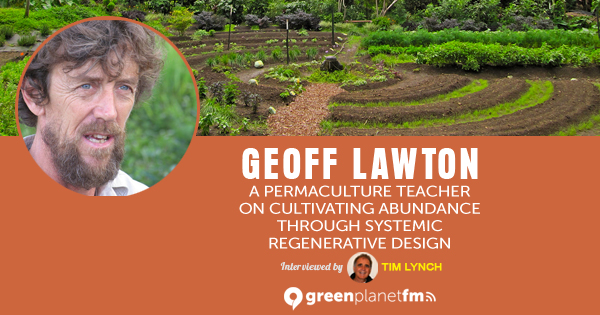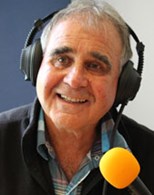
Geoff is continually invited to go to many countries from very developed, to others that are environmentally distressed and now, situations of conflict
where he finds himself putting both conflict and environmental circumstances back together - in a sustainable form. Even looking towards establishing
eco city developments and eco villages as examples, as the permaculture design system covers all climates, all landscapes and virtually all contingencies.
Permaculture to him is essentially a journey of discovery through a career of assisting people towards embedding sustainable knowingness – which has been
taught as a subject since 1979 - to over 15,000 students and NZ too has a number of superb students now fully trained as experienced teachers, many
working globally as leaders in their field.
There is also a growing awareness that we need to be resilient and self-reliant and though not seen out in the public realm, behind the scenes there are
many people who have a feel for the land, and see themselves asking the question how does a human being live on a planet and in community and sustainably.
That the word ‘sustainability’ is today used in every global aid proposal - where conversely when the Clark Labour Government administration here in NZ
left power, it is alleged that the new National Government administration passed a memo to all governmental departmental heads, asking them to not
use the word sustainability in any ecological or environmental context.
Yet, whilst Geoff was here in NZ in 2004, he witnessed that sustainability was the buzzword in regional sustainability plans and Geoff defines sustainability
as an energy audit – “a sustainable energy system produces more energy than it consumes. At least enough in surplus to maintain and replace that system
over its lifetime” – and that’s it. Any surplus above that is aiming towards abundance. This is where we end up with good permaculture design – in
time in absolute abundance. – and ‘we end up in a permanence in culture’. This then gives us great stability.
Many years ago FOE - Friends of the Earth in the UK said we need 8 planets if China wants to copy US consumer habits and Geoff mentions that he has seen
figures that state that if the all the developing countries want these consumers habits - 35 planets are needed.
Passive Retreat what does this mean? - in James Lovelock’s terms - (the initiator of the Gaia Hypothesis, now Theory - that our planet is a self-sustaining
colossal living super organism) – How can we halt constant growth on a finite planet?
Geoff says that when we study living systems it is the natural system which is the ultimate sustainable model – we can in a positive mode of function create
an abundance, speciation, and enrichment resulting in stability or we can create - by a destructive mode depletion, pollution, negativity and conflict.
So the choice is ours we either move in a positive direction with the solution or we be part of the destructive mode and we urgently need to know the
way to act. For example – we can turn rain forests to desert or deserts into rain forests.
In understanding nature he says that when we study the writings on ecology we see that it has always been written in a passive observation - as if we do
not have a right to interact or be creative in that process. (More about this in the interview.)
Permaculture examines ecology and gives you a direction in which to act so that ecology due to your actions becomes richer – that ecology becomes something
that benefits from human action where it leaves a more elegant footprint rather than an ugly one. He sees that we have reached an evolutionary state
where at heart we want to act sensitively with our planet and we need a tool kit - we need a design system, we need a way to behave.
Geoff says that when he talks to elderly people they will quickly reflect back on their life and say that’s right that’s what’s needed – and we can talk
to the very young and they say yes! That is the way to behave - that’s what we want to live in - in the future. Whereas everyone else in the middle
are caught up in the busyness and chaos that surrounds them - to actually take time out and say right – we need to listen to that. So today even 12
years after this interview, Geoff says that we are living in a somewhat confused state, spending a lot of time rushing around and not enough time reflecting
on the questions we need to ask.
This interview tells of his restoration and regeneration of barren land near the Dead Sea in Jordan, where it looked like the end of the world. It was
so hot, so salty, so flat, so damaged - yet the result that they got there gave him and his team so much credibility than anywhere else, because what
they repaired and brought back into bounty was just so obvious.
Permaculture is also a system that breeds its own teachers, taking in keen raw recruits to assist in the process and they become students that in many
cases they end up as teachers after a wide experiential process of learning and application.
The interview covers monoculture food crops that are enormously out of scale - that due to chemical and synthetic fertilisers, plus GE and sucking up huge
amounts of water are destroying and depleting the soils, causing erosion and loss of fertile top soil. That the main crops in the world are now only
5 wheat, rice, corn, soy, potatoes when in 1950 there were 12, and they are depleting in number all the time - whilst going up in price. The price
that humanity is paying for.
Monocultural crops destroy systems and remove soils from the landscape. Geoff says, if we want to find more soil we will have to take down more forests,
because it is only eco systemic production – or, it is only ecosystems that produce soil.
The crucial issue here is that over a hundred years ago, many in the world worked on the land, on farms, where today, there are very few people out on
the land and on farms anymore. Where they were more often than not, outside in the wind and rain and got dirt under their fingernails – they saw and
felt the seasons, they noticed the arc of the sun and moon changing all year round, looking at the weather, the environment and checking the soil in
the productive sense of things.
Now, today - what is creeping up on us and we are not really aware of it is most of us live in cities, driving to work in air conditioned cars, working
in tinted glass office blocks or fluorescent lit factories, most have jobs and shop in a supermarket - that we seldom look up. So as we become more
disconnected from the land and through factory and industrial farming we deplete our soils, there are very few options and less and less forests for
us to pull down to gain good soils for farming.
Though he loves the words ‘organic food’ it will not feed the world, because it is not ecosystemic. It still allows topsoil to be depleted due to erosion
etc. In saying organics will not really save the day, you will have to listen to the interview for his reasoning.
He states that a new evolution is required and is actually happening. It’s called eco systemic - meaning it is soil creative, that while it is producing
food, is it also creating soil and if it is, and it’s gaining even a little more soil - we can go on forever - we can live sustainably and the criteria
of permaculture design system is that it does not deplete soil and it does not remove soil and to some degree - at least creates soil.
Because there is only so much of our base resource left and we are increasing the stress on our base resource and that is our soils. And it is only created
by plants because plants create carbon from photosynthesis and ecosystems major in forests and major in trees. We have to start implementing agriculture
which is integrated with forestry with trees and productive tree systems – we can’t just be out of scale.
Geoff also says permaculture is complicated, but not rocket science – it is complicated enough to be very, very interesting and something that you can
study for all of your life - in fact that you can become infected with permaculture that it can become terminal so that you will always be interested
in it. You will always be studying it and you will always be researching it to some degree.
He then takes us through how you would set up a system by taking in the landscape – this can be heard on this download. Covering interactive diversity
this is the key and much of it gives you the interactions leading to stability – that naturally gives you fertility.
He states that permaculture could feed the whole world on only 2% of the land area that we use in area today. Listen to how he explains this of how to
produce the same amount of nutrition on only 2% of present land use. It could be 3% by now as this was a 2004 interview.
We need to re-pattern for eco systemic production and have it close to where people live in huge cities. Permaculture being a poly culture or poly
ecosystemic system which is enthusiastic for diversity in every form - the more diversity you have - the more potential links you have - thus the more
stability and resilience within in the system.
He cautions, don’t hate anything in living systems – weeds or pests in any aspect of your life – because they will come back to haunt you …
Life is art and science and the merging of the two for our mutual survival.
He finishes with his compelling story of the Dead Sea, Jordanian experiment of building fertile and abundant food forest on damaged, dry, salty, scorching
hot desert land. The web site follow up is:
http://permaculturenews.org/2013/11/19/rough-ready-real-november-2013-update-dead-sea-valley-permac ulture-project-aka-greening-desert-sequel-site/
As well, Geoff honours Joe Polaischer of Rainbow Valley Farm in Matakana for the magnificent contribution to permaculture here in NZ.
This is an inspiring story teller by a focussed pioneer of new models of sustainability and living in accord with nature’s process.
http://permacultureaustralia.org.au
https://www.permaculture.org.nz
The NZ National Permaculture hui will run from April 23-25th 2016 and be located at a quiet and private retreat situated on the banks of the mighty
Waikato River at Lake Karapiro, Cambridge.
Epworth Retreat
116 Finlay Road, RD 2
Cambridge, 3494
https://permaculture.org.nz/contact
